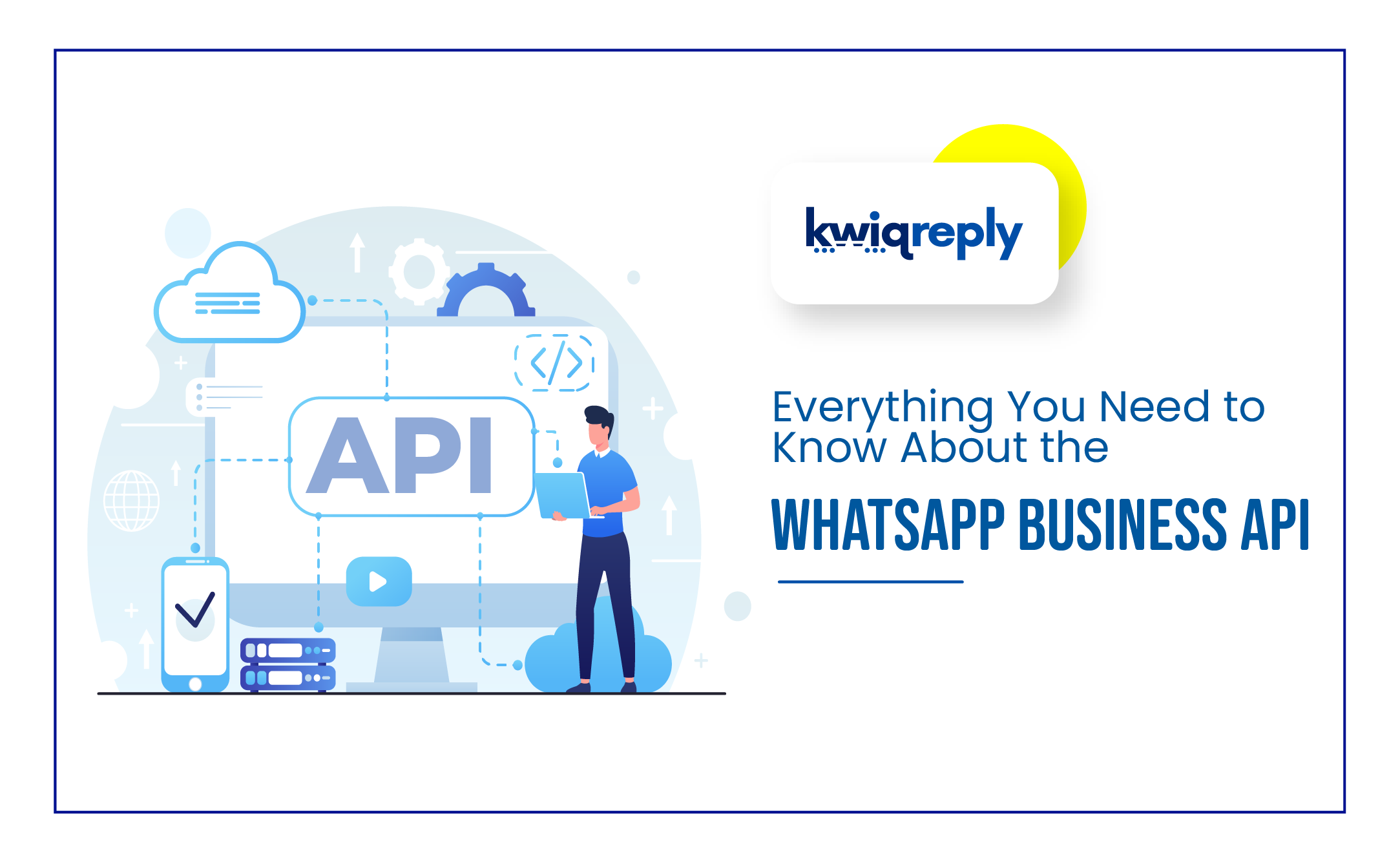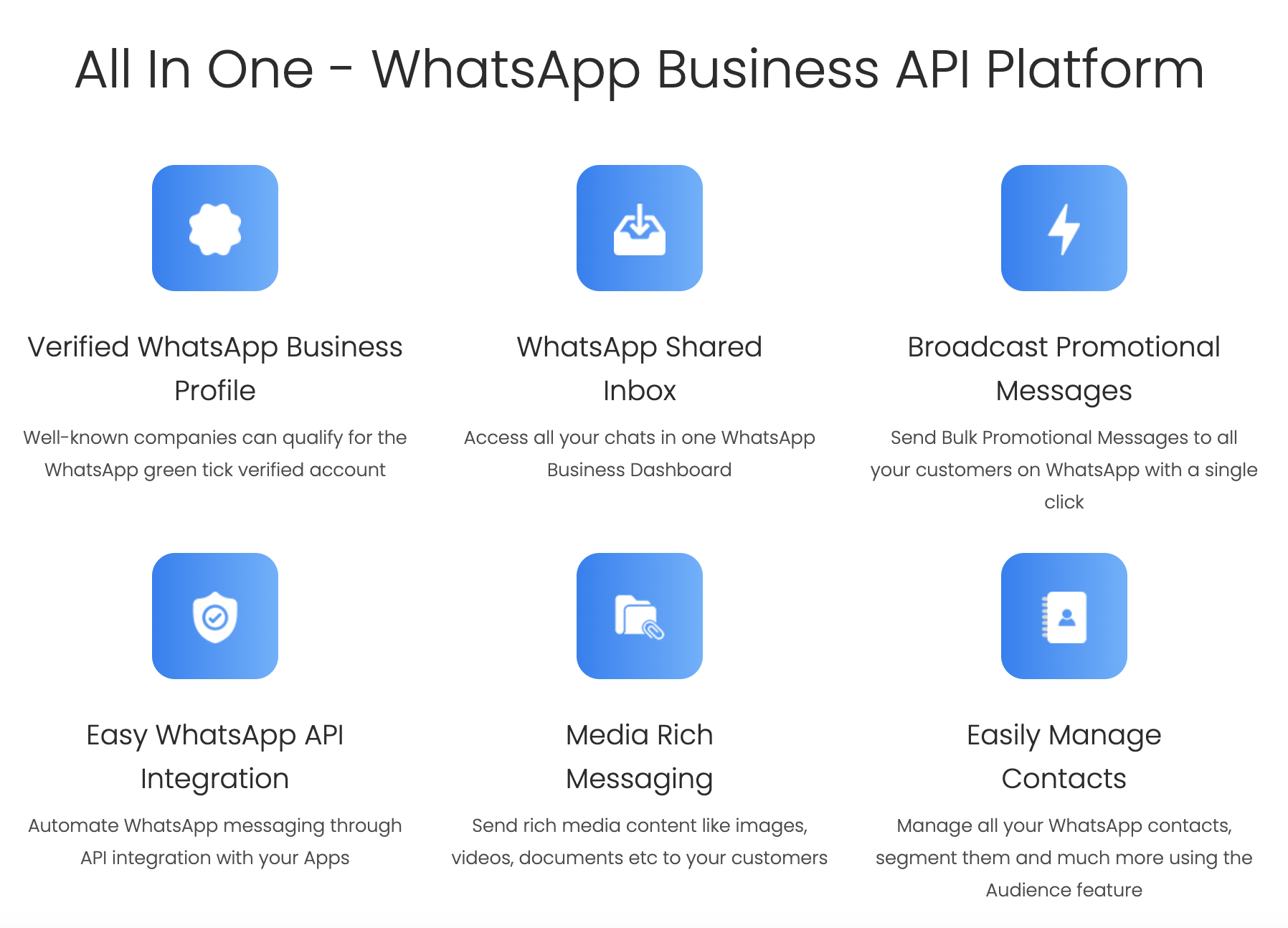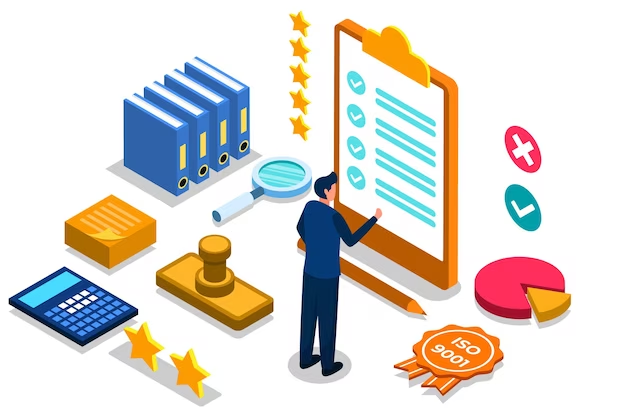
Everything You Need to Know About the WhatsApp Business API
WhatsApp has revolutionized customer communication. Its global user base of over 2 billion offers an incredible opportunity for businesses to engage with their audience. To take this engagement to the next level, WhatsApp introduced the WhatsApp Business API. In this blog, we'll delve into its features and benefits, and why it's a game-changer for businesses of all sizes.
TL;DR
- The WhatsApp Business API offers features such as message automation, template messaging, integrations, business verification, multimedia attachments, etc.
- Its benefits include
- Enhanced customer engagement
- Improved customer service
- Reduction of business costs
- Increased conversion rates
- Improved brand credibility
- Access to customer data and insights
- Ability to scale with business
- Increase reach to a global scale
- Enhanced customer engagement
- Some challenges of using it are
- The costs of high-volume messaging
- The technical expertise needed for solo users
- The approval and appropriate use of the WhatsApp Business API
- The stringent adherence to templates
- The necessity of opt-in from customers
- Striking a balance between privacy compliance and marketing
- Varied popularity globally from region to region
- Complexity of integrations
- External factors such as network connectivity, user preferences, changes in policy, and competition from competitors
- Industries that can use the WhatsApp Business API include E-commerce, Healthcare, Hospitality, BFSI, and Travel
- With Meta acquiring WhatsApp, it has become integrated with several Meta platforms letting you leverage several of them synergistically.
- Thus they can also leverage the rich database that Meta has of its users and their preferences
- This represents a trend in businesses towards increasing their offerings and diversifying their services which can only be maintained given that they adhere to privacy regulations
Sign up for the WhatsApp Business API and boost your business communication to new heights today!
What are the Features of WhatsApp Business API?

-
Automated Messaging:
The WhatsApp Business API enables businesses to automate messages, making it easier to respond to customer inquiries promptly. It supports predefined responses, allowing businesses to set up quick replies and frequently asked questions.
-
Multimedia Messaging:
Businesses can send not only text messages but also multimedia content like images, videos, documents, and even location pins. This rich media capability helps in delivering a more engaging and informative customer experience.
-
Group Messaging:
The API permits group messaging, enabling businesses to create customer groups or segments and send broadcast messages. This is particularly useful for promotional campaigns, product launches, or updates.
-
Verified Business Accounts:
WhatsApp offers a verified badge for businesses, which helps establish trust and authenticity among customers. Verified accounts are more likely to be contacted by potential customers, increasing conversion rates.
-
Customer Insights:
The API provides access to valuable customer data and insights, allowing businesses to better understand their audience. This data can be used for personalized marketing strategies and improving customer service.
-
Integration with CRM Systems:
WhatsApp Business API can be seamlessly integrated with Customer Relationship Management (CRM) systems. This integration streamlines communication and allows businesses to manage their customer interactions more efficiently.
-
Templates for Transactional Messages:
Businesses can send transactional messages like order confirmations, shipping notifications, and appointment reminders. Templates ensure consistency and compliance with WhatsApp's policies.
-
Security and Encryption:
WhatsApp uses end-to-end encryption, ensuring the security and privacy of customer conversations. Businesses can be confident that sensitive information remains protected.
-
24*7 Availability with Chatbots:
With the API and chatbots, businesses can provide round-the-clock customer support. Customers can reach out at any time, enhancing the convenience factor.
What are the Benefits of Using the WhatsApp Business API?
Enhanced Customer Engagement: WhatsApp's popularity ensures that businesses can connect with their customers on a platform where they are already active. This fosters a more personal and interactive relationship between brands and customers.
Improved Customer Service: The API allows for quicker response times and automated support, reducing customer frustration. Businesses can resolve issues promptly, leading to higher customer satisfaction.
Cost Optimization: Automating responses and managing customer interactions through the API can significantly reduce operational costs. It eliminates the need for extensive manual communication and additional expenses on marketing and customer support.
Increased Conversion Rates: WhatsApp Business API can be a powerful sales channel. Sending product information, updates, and promotions directly to customers can lead to higher conversion rates.
Brand Credibility: Verified business accounts on WhatsApp are perceived as more trustworthy. This can boost a brand's credibility and encourage more customers to engage.
Data-Driven Decision Making: Access to customer data and insights allows businesses to make informed decisions. It helps in tailoring marketing strategies and product offerings to suit customer preferences.
Scalability: The API is suitable for businesses of all sizes, from startups to large enterprises. It can grow with your business and adapt to changing needs.
Compliance and Security: WhatsApp is committed to data privacy and compliance with regulations such as GDPR. Businesses can use the API with confidence, knowing that they are following best practices.
Global Reach: WhatsApp's extensive global user base means that businesses can reach customers all over the world. It opens up new markets and opportunities for expansion.
What are some Challenges of Using the WhatsApp Business API?
The WhatsApp Business API, with its plethora of features and benefits, has garnered considerable attention. However, like any technological solution, it comes with its own set of challenges and downsides.
-
Cost Implications:

One of the primary concerns for businesses considering the WhatsApp Business API is the associated costs. WhatsApp charges businesses based on the volume of messages sent, and this can add up quickly. This is particularly true for larger enterprises with extensive customer bases. Smaller businesses may also find the pricing model a bit steep, affecting their ability to use the platform effectively.
-
Technical Complexity:

Implementing the WhatsApp Business API requires a certain level of technical expertise. Businesses need to set up and manage servers, ensure compliance with WhatsApp's policies, and handle APIs effectively. This can be challenging for smaller companies or those without dedicated IT resources. However, by signing up for the API through a WhatsApp Business Solution Provider like kwiqreply, this need is eliminated.
-
Approval Process:

WhatsApp has a stringent approval process for businesses looking to use the API. Not all businesses are eligible, and the application process can be time-consuming. Even after approval, WhatsApp may closely monitor the business's use of the API, and any violations could result in suspension.
-
Limited Message Templates:
WhatsApp enforces strict guidelines regarding the use of templates for certain types of messages, such as transactional or promotional messages. Businesses must adhere to these templates, which can limit the creativity and flexibility in their communication with customers. Any deviation from these templates can result in message rejection.
-
Customer Opt-In:

Businesses cannot initiate conversations with customers on WhatsApp without their explicit opt-in. This can be challenging, as getting customers to opt in can be a slow and uncertain process. It requires businesses to actively promote their WhatsApp presence and convince customers to engage.
-
Customer Privacy Concerns:

WhatsApp places a high premium on user privacy, which is a good thing for consumers. However, this can be a challenge for businesses that rely on collecting and analyzing customer data for marketing purposes. Striking the right balance between privacy compliance and effective marketing can be tricky.
-
Global Limitations:
While WhatsApp has a massive user base worldwide, it's not equally popular in all regions. Currently, WhatsApp is the most popular messaging app in India and Brazil, with the former being the largest user base. In some areas, alternative messaging apps dominate the market. This can limit the global reach and impact of a WhatsApp Business API strategy.
-
Integration Complexities:

Integrating the WhatsApp Business API with existing CRM systems, databases, and other tools can be complex. It requires significant customization and development work to ensure seamless communication and data flow between systems. WhatsApp Business Solution Providers (BSPs) like kwiqreply can help in this regard with their expertise in API and integrations.
-
Message Delivery Challenges:
Message delivery on WhatsApp is subject to factors like network connectivity, phone number changes, and even user preferences. Messages may not always reach the intended recipient, leading to potential customer communication gaps.
-
Competition and Clutter:
WhatsApp's popularity means that users receive a substantial volume of messages from various businesses and personal contacts. This makes it difficult for your messages to stand out in a crowded inbox, diminishing the effectiveness of the platform.
-
Regulatory Compliance:
WhatsApp Business API usage must comply with various regulations, including data protection laws like GDPR. Businesses must navigate a complex regulatory landscape and ensure their messaging practices are in line with legal requirements.
-
Limited Customer Support:

Getting timely and effective customer support from WhatsApp can be challenging. Businesses may encounter difficulties in resolving technical issues or obtaining assistance with their API implementation. However, once again WhatsApp BSPs can help you here by providing you with support during and after onboarding.
-
Content Moderation:

WhatsApp actively monitors the content sent through the API to prevent spam and abuse. While this is essential for maintaining the platform's integrity, it can lead to delays or rejections, even for regular communications.
-
Dependency on WhatsApp:
Relying heavily on WhatsApp as a primary customer communication channel can create dependency issues. Any changes in WhatsApp's policies or pricing can have a significant impact on a business's operations.
What are Some Real-World Use Cases of the WhatsApp Business API?
Let's take a look at how businesses are leveraging the WhatsApp Business API in practical scenarios:
E-commerce: Retailers use the API to send order confirmations, shipment tracking updates, and product recommendations. It facilitates direct communication between customers and support teams.
Healthcare: Healthcare providers send appointment reminders, prescription updates, and health tips. Patients can easily reach out to doctors or clinics for queries.
Hospitality: Hotels use the API for booking confirmations, check-in instructions, and concierge services. Guests can request assistance or information via WhatsApp.
Banking and Finance: Banks send balance notifications, transaction alerts, and account statements. Customers can inquire about their accounts and report issues.
Airlines: Airlines provide flight details, boarding passes, and flight status updates.Passengers can ask questions or make changes to their bookings.
Meta and the Broader Ecosystem
Now, let's delve into the relationship between the WhatsApp Business API and Meta. Meta, formerly known as Facebook, is a tech conglomerate that owns a range of popular social media platforms and services. This includes WhatsApp which, therefore makes it fall under the Meta umbrella.
Integration with Facebook Business Tools
One notable synergy between the WhatsApp Business API and Meta is the integration with Facebook's suite of business tools. This integration allows businesses to manage their customer interactions seamlessly across various Meta-owned platforms, including WhatsApp. For example, a business can use Facebook's Ads Manager to create targeted ad campaigns and connect with customers on WhatsApp.
Data Utilization and Insights
As part of the Meta ecosystem, WhatsApp Business API users can tap into the data-rich environment that Meta offers. This includes access to user behavior data, demographics, and insights across various platforms. This wealth of data can be harnessed to create more targeted marketing campaigns and strategies. This ultimately benefits businesses that use the WhatsApp Business API. Additionally, the relationship between the WhatsApp Business API and Meta holds broader implications for the digital communication landscape.
Diversification of Services
Meta's investment in WhatsApp signals a broader trend in the tech industry where major players aim to diversify their services. This diversification allows companies like Meta to capture more aspects of users' online lives to understand their needs better. Thus data and insights on everything ranging from social interaction to commerce and customer service can be collected for analysis. By leveraging them businesses can make more informed decisions about their marketing strategies, product offerings, and customer interactions.
Privacy and Security Considerations
As businesses use WhatsApp Business API within the Meta ecosystem, they must remain vigilant about privacy and security. The handling of customer data and adherence to privacy regulations are paramount concerns to maintain trust with users.
In Conclusion,
The WhatsApp Business API is a powerful tool that empowers businesses to connect with their customers on a deeper level. It offers a wide array of features that enhance customer engagement and streamline operations. The benefits are clear but so are some of the hurdles of using it. However, as mentioned WhatsApp BSPs can help mitigate many of these challenges.
As the digital landscape evolves, integrating the WhatsApp Business API into your customer communication strategy can be a game-changer. It's not just about staying connected; it's about creating meaningful and efficient interactions that drive growth and customer loyalty.
So, if you haven't explored the WhatsApp Business API yet, get ready to scale your business’s customer engagement. Many businesses have successfully integrated the WhatsApp Business API into their communication strategies and reaped the rewards.
At kwiqreply, we help you fully leverage the features of the WhatsApp Business API for your organization. kwiqreply is the best WhatsApp Business API CRM and Helpdesk for Small Businesses. kwiqreply’s integration with the API offers dynamic features such as bulk messaging, customizable templates, account verification, and much more.
So, seize the opportunity, leverage WhatsApp's potential, and propel your business toward sustainable growth and success! Know more about WhatsApp Business API’s features and start nurturing leads with kwiqreply by clicking the link below.
Click here to book a free demo and let us show you how you can do more business with WhatsApp.
Read more blogs like this -
Frequently Asked Questions
Can you download the WhatsApp Business API for free?
Unfortunately no. There is no free download of the WhatsApp Business API but kwiqreply can provide you with a trial{H3}demo so you can see the power of the WhatsApp Business API in practice. This also gives you time to familiarize yourself with the software.
Who is the Best WhatsApp Business API Service Provider in India?
kwiqreply is the best WhatsApp business API service provider in India. With its affordable pricing options and a plethora of integrations, kwiqreply is the most cost-efficient choice for your business.
Is the WhatsApp Business API Meta?
No, WhatsApp is only owned by Meta. It is not a part of the ecosystem being built in the virtual space.
What is the cost of WhatsApp Business API?
Costs for the WhatsApp Business API vary based on location and volume of messaging. You can use our free Business Pricing Calculator to calculate your costs or look at our blog here for a full chart on WhatsApp Business API pricing.